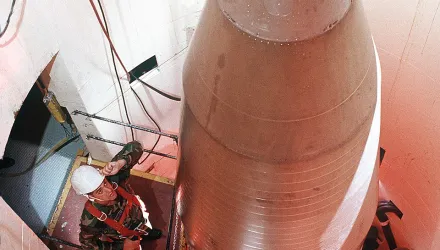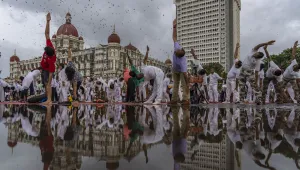Introduction
I would like to make some observations on the "Arab Spring" following a cruise I took between the 7th and the 24th of April 2011 along the southern coast of the Mediterranean. The ship, the Corinthian II, chartered by Harvard and Stanford alumni associations, stopped in Morocco, in Algeria, in Tunisia, and in Egypt. A visit to Libya was cancelled, for evident reasons. I was one of the presenters on the trip, and I dealt with recent history and the current situation in these countries. The other speakers were archaeologists and classicists.
Longevity, corruption, repression
Longevity, corruption, repression—these are the three terms that come to mind in thinking about the Arab Spring.
Longevity: the Arab dictators—Tunisia's Zine El Abidine Ben Ali, Egypt's Hosni Mubarak, Libya's Muammar Qadhafi, Hafez and Bashar Assad of Syria, Yemen's Ali Abdallah Saleh, etc. remained in power for a very long time. There was a feeling of lassitude toward these leaders, as in the nickname given by Egyptian satirists for President Mubarak—la vache qui rit.
Corruption: people became more and more conscious of this scourge, as details were now being openly divulged by social networks—Facebook, Twitter, etc.
Repression: the violence committed by the security forces—particularly in Egypt by the Mabaheth Amn el Dawlah, the State Security Investigation Service—had a profound effect on the population. The most notorious example was that of the young Khaled Said, who was hauled from an internet cafe and beaten to death. The photograph of his mangled face was put on the web by a Google employee in Cairo, Wael Ghonim, who was in turn arrested and imprisoned for some ten days. On his release, he was to emerge as one of the heroes of the Egyptian revolution.
Tunisia
Tunisia is where it all began. As we all know, the expression "Arab Spring" is only an approximation. In fact it began in the middle of winter, in a small town in the center of Tunisia, Sidi Bouzid, on December 17, 2010, with the self-immolation of a street vendor, Mohammed Bouazizi. Contrary to what was first reported, he was not an unemployed graduate unable to find work. He was simply a street vendor. He had been insulted by a female police officer, who reportedly slapped him, because he did not have a vendor’s permit. His wares were confiscated. It was the last straw for him, and he decided to commit suicide by setting himself on fire. This was the spark that started the insurrection very rapidly, in Tunisia and later elsewhere.
It is interesting to note that the Wikileaks dump on Tunisia took place about a month before the suicide of Mohammed Bouazizi. Whether it had an effect on the growing dissatisfaction in the country is hard to judge, as stories of corruption in the Ben Ali family and among his in-laws (the Trabelsi family) were pretty widespread. But there was one leaked cable that was particularly striking. It was an account of a party at the seaside resort of Hammamet at the home of a member of the Trabelsi family. The account was by the U.S. Ambassador, I believe, and the party was excessively lavish and over the top and included the display of a tiger in a cage. Leila Trabelsi, a former coiffeuse, is the second wife of Ben Ali, and her relatives were well known for their extravagances. The director of Wikileaks, Julien Assange, in an interview in Le Monde, stated that the Wikileaks documents on Tunisia showed that the United States was not prepared to intervene on the side of the corrupt regime of Ben Ali in case of a serious opposition movement, and this was in effect an encouragement for the insurrection.
At the present moment, and in spite of occasional disturbances in the streets, Tunisia seems to be on the right path. There is due to be on July 24 an election for a National Council which will have constituent powers. The Council will consist of 124 members, with representatives from all the districts of Tunisia. The Council will be charged with drafting a new constitution and in particular, deciding if the country will have a presidential or a parliamentary system, or a combination of both.
Morocco
The situation in Morocco is in certain aspects like that of Tunisia: a high level of unemployment, a growing gulf between the wealthy and the masses of poor, a cabal of rich exploiters around the sovereign who hold most of the reins of the economy, and an absence of political expression on the part of the population.
But the comparison stops there. Morocco is a more liberal society than was Tunisia, especially regarding a certain liberty, although limited, of the press. Secondly, and it is very important, the King of Morocco, Mohammed VI, has a legitimacy that that was completely absent in the case of Tunisia, and stems from the fact that the Moroccan dynasty claims to be descended from the Prophet Mohammed.
There has recently arisen in Morocco an incipient protest movement, apparently stimulated in reaction to the revolutions in Tunisia and Egypt. The movement is called the "Movement of 20 February for democracy and liberty now"—the February 20 being the date that demonstrations were launched in Morocco. In response to this protest movement, King Mohammed VI made a declaration on March 9 in which he stated that he was going to create a commission that would propose by June a reform of the constitution. The new constitution would be submitted to the people in a referendum in September 2011.
The King proposed a number of lines of reform, including "constitutionalizing" human rights, the independence of the judiciary, the strengthening of the lower house of parliament, the increase in the powers of an elected prime minister, instruments to combat corruption, and the strengthening of the Berber language in Morocco.
King Mohammed VI is closer to the people than was his father, King Hassan II. The latter, exceptionally intelligent and adept at political maneuver, was a rather intimidating figure. Right after the terrorist attack in Marrakech, Mohammed VI visited the scene to express his sympathy. It seems likely that the attack was committed by Al Qaeda in the Islamic Maghreb (AQMI) although the latter has denied any connection with the event. Most of the members of AQMI are Algerians who have been forced back into the Sahel, the area south of the Maghreb.
So even Morocco, with its aura of a monarchy that claims descent from the Prophet, has not been spared from the so-called "Arab Spring." To give an example, and as reported in Le Monde, a young Moroccan based in New York addressed on camera a message to the King, in dialectical (i.e. Maghrebian) Arabic and in a tone of (unrespectful) familiarity: "Mohammed, come down into the street and see how people live. Sell one of your palaces, to help them. Morocco would outdo Dubai if you returned [all] the money you have taken…."
The difference, in contrast with the past, is that this video, posted on Facebook, has had 500,000 hits.
Algeria
Algeria is a case apart, with a problem of legitimacy stemming from the fact that a revolutionary movement against the French occupation morphed itself into a military dictatorship ruling over a state. The present president, Abdel Aziz Bouteflika, is the last of the leaders of the revolution. With an aging and ill president, it is necessary for Algeria to create a new legitimacy.
The several demonstrations in Algeria that accompanied the Arab Spring were severely repressed by the authorities. The Islamist insurrection that lasted the entire decade of the 1990s was in the end crushed by the government, and the Algerian people are tired of war. A revolutionary movement could emerge but not right away, it seems to me.
Egypt
In the thirty years of Hosni Mubarak's rule, from 1981 to 2011, Egypt seemed to be in a deep freeze politically, eclipsed by the Iranian revolution and by the events in Iraq (although Egypt did participate in the Gulf War of 1990–1991). Here was the largest country by far in the Arab world—more than 80 million people—seemingly confined to the sidelines. One of the themes I detected in the recent revolutionary events in Egypt was that the Egyptians want to be players again, to play a large role in the events of the region, as was the case when Gamal Abdal Nasser dominated the headlines in the 1950s and the 1960s.
Mubarak proved to be a loyal ally of the United States and a credible, if not warm, partner with Israel in keeping the peace in their part of the world. But Mubarak's regime was repressive and did not allow for much political expression. The dreaded Egyptian internal security service, kept a tight lid on protest movements. The situation worsened as Mubarak grew older and refused to provide for a succession by naming a vice-president, as he himself had been named under Anwar Sadat. When one of his two sons, Gamal, looked to be being groomed as a successor, the army seems to have protested such a move, either implicitly or explicitly.
In 2005, Mubarak introduced amendments to the Constitution of 1971 which had been promulgated by Anwar Sadat after the death of Nasser. The amendments had the effect of rigging the political system, in that a candidate for president had to be a member of a political party and that that party had to have achieved at least five percent of the seats in Parliament. This meant that only the candidate of Mubarak’s National Democratic Party could become president, as the Muslim Brotherhood had been outlawed.
The Egyptian revolution of 2011 was long in the making. Opposition groups had sprung up, such as the Kifaya movement (Kifaya meaning "enough"), the 6th of April movement, and the party of Ayman Nour, who had unsuccessfully contested the presidential election with Mubarak in 2005 and had then been jailed. But the last straw was the parliamentary election of late 2010 which was blatantly rigged and in which Mubarak's party had won nearly all the seats. The 2010 elections were a key element in the rising unrest, and the catalyst was provided by the self-immolation of a Tunisian street vendor on December 17th of last year. The Tunisian revolution erupted with surprising speed, and the Egyptian revolution, aided by a deluge of social networking, broke out on January 25, 2011. Three groups emerged from the uprising: a loose coalition of youth groups; the so-called group of wise men, or elder statesmen who had been sidelined under Mubarak; and the Muslim Brotherhood.
As the street movement grew in intensity, Mubarak finally named a vice-president, Gen. Omar Suleiman, the head of Egyptian military intelligence, but this had no effect on calming the massive protest movement in Tahrir (aka Liberation) Square.
On February 11, when the demonstrators announced their intention to march the next day on the Presidential Palace to show their furor at the unexpected and threatening speech Mubarak had made the evening before, the situation became unblocked. The Army, in the form of a little known body, the Supreme Military Council, led by its ranking figure, Marshall Tantawi, stepped in and persuaded or compelled Mubarak to leave power. There followed a terse announcement by General Omar Suleiman later on the evening of February 11 that Mubarak had resigned the presidency. He and his family left forthwith for Sharm-al-Shaykh and his residence there.
Obviously, things are going to change in Egypt. Although the Supreme Military Council reaffirmed Egypt's adherence to the treaty of peace with Israel, there will certainly be some modifications in Egypt's policy towards its neighbor, and we are already seeing signs of this.
The referendum of March 19 endorsed a number of amendments to the constitution, notably that it opens up possibilities for those who want to run for public office, including the presidency. Parliamentary elections are to be held in September and presidential elections two months later. If indeed Egypt acquires a civilian president by the end of this year, it will be a very significant change, as the country has been ruled by the military ever since the revolution of 1952, when the so-called "Free Officers Movement" overthrew King Farouk.
Libya
The military operation launched against the regime of Muammar Qadhafi on March 19, 2011, was conducted in the context of the "responsibility to protect," a principle endorsed by the United Nations in 2005…which meant that an intervention in a foreign country can be justified if the leader of a country is engaging in a massacre of his own people.
There have been two resolutions of the United Nations Security Council against the regime of Qadhafi. The first, Number 1970, called on the International Court of Justice to investigate whether the Qadhafi regime had violated the human rights of its citizens. The second, Number 1973 of March 17, 2011, submitted by the French with the support of the British and at the last moment by the Americans also, authorized a no-fly exclusion zone over Libya as well as all other measures aimed at protecting the Libyan people, but not to include the use of ground troops.
The aerial attacks against the Qadhafi regime have been generally accepted, at least initially, as necessary to save the population of Benghazi, threatened by the tanks of Qadhafi who had stated he was going to clean out the city "house by house." Moreover there was a precedent” in June 1996, when 1,200 prisoners at Abu Salim, outside of Tripoli, demonstrated against the conditions of their detention, they were all executed on orders of Qadhafi.
However, although the operation to save Benghazi was deemed necessary, what followed resembled a sort of Greek tragedy. The reality is that Qadhafi, with his military units commanded by his sons, and also with his arms and his money, has proven stronger than anticipated; whereas the rebels, badly equipped, badly trained, disorganized, and divided among themselves, have turned out to be weaker than was supposed. This disequilibrium might be corrected in time, with the aid of the allies, but not, it would seem, in the immediate future…unless a surprise event, such as the sudden departure of Qadhafi, might occur.
In Libya, it is not so much a general uprising by the people as a whole, as was the case with Tunisia and Egypt. There are some aspects of a civil war between the east and the west in Libya which have contributed to the present stalemate. This where things stand. For the world powers of the West, to borrow a phrase from France's General Charles de Gaulle (by which he meant the United States, Great Britain, and France), it would be a grave loss of face if they showed themselves incapable of preventing the continuation of the Qadhafi regime in Libya.
Statements and views expressed in this op-ed are solely those of the author and do not imply endorsement by Harvard University, Harvard Kennedy School, or the Belfer Center for Science and International Affairs.
Cogan, Charles G. "The Arab Spring in the Southern Mediterranean." Belfer Center for Science and International Affairs, Harvard Kennedy School, May 24, 2011.





